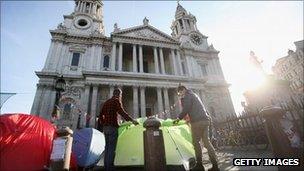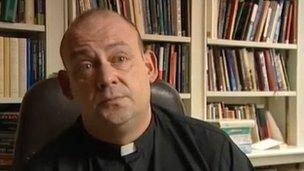Ed Miliband warns of St Paul's protest 'danger signals'
- Published
- comments
Ed Miliband: "Many angry, not just people in tents"
The protests at St Paul's Cathedral are "danger signals" and reflect the concerns of millions of people, Labour leader Ed Miliband has said.
Writing in the Observer, external, Mr Miliband said the protesters reflected a wider crisis in confidence about the values of those in business and politics.
And ex-bank chairman Ken Costa told the Sunday Telegraph, external the finance industry had lost sight of the need to do good.
The protest against corporate greed began on 15 October at the London site.
In the newspaper article, Mr Miliband warned "only the most reckless" would ignore the Occupy London protest and others around the world.
'Rises to challenge'
"The challenge is that they reflect a crisis of concern for millions of people about the biggest issue of our time: the gap between their values and the way our country is run," he said.
"I am determined that mainstream politics, and the Labour Party in particular, speaks to that crisis and rises to the challenge."
Mr Miliband said many people would not agree with the protesters, but he warned that people felt "let down" by aspects of business, finance and politics which "seem in touch with the richest 1% - but badly out of touch with the reality facing the other 99%".
Record unemployment, rising inflation, squeezed living standards and turmoil in the eurozone added to the "sense that the economy is on the brink", he said.
He went on to say "business as usual is not an option" and "productive, responsible behaviour which benefits business and most people in the long term" was the way forward.
"In every generation, there comes a moment when the existing way of doing things is challenged," Mr Miliband said.
"It happened in 1945. It happened in 1979 and again in 1997. This is another of those moments because the deeper issues raised by the current crisis are too important to be left shivering on the steps of St Paul's."
'Afflict the comfortable'
BBC political correspondent Carole Walker said Prime Minister David Cameron had been far more cautious in his response to the protests.
Last week, Mr Cameron said the Archbishop of Canterbury had spoken for the whole country when he called for greater responsibility at the top of society.
But the prime minister has also said the freedom to demonstrate does not include the freedom to pitch a tent anywhere in London.

The cathedral closed last Friday
Shadow foreign secretary Douglas Alexander, speaking on BBC One's Andrew Marr Show, said the Church also had a role to play in calling for change.
"I think the job of the Church is not simply to comfort the afflicted, but to afflict the comfortable," he said.
"Its calling through the ages has been to be a prophetic voice on issues of public morality.
"And I think as Ed Miliband reflected in his article in the Observer today, what the protesters are doing in a very distinctive way - which many of us wouldn't ourselves engage in - is speak to a much deeper unease in society about the rules by which society is being run."
Chief Secretary to the Treasury, Danny Alexander, appearing on the same programme, said: "It is very important that there is a strong sense that we're [politicians] doing the right things here, and that we do get away from an economic culture that's been based on excess, which it has been for the last 20 or 30 years."
Moral imperative
Meanwhile, the banker chosen by St Paul's Cathedral to head a group looking to reconnect "the financial with the ethical" has warned that the market economy has "managed to slip its moral moorings" with "disastrous consequences".
Writing in the Sunday Telegraph, the former chairman of Lazards Investment Bank, Ken Costa, said the finance industry had lost sight of the need to do good as well as make money.
Mr Costa, who helps to promote the Alpha Course, which is an introduction to the Christian faith, said maximising shareholder returns should no longer be the "sole criteria" for judging how a company is run.
But he insisted the market economy was the most successful system yet devised for improving living standards, and that there was a moral imperative to create wealth.
Last week, the Corporation of London abandoned plans to take legal action to try to force the estimated 200 protesters to leave the site outside the cathedral.
In what was described as a "great U-turn" by the Occupy London Stock Exchange group, the corporation made an offer to allow the protesters to stay until 2012 but urged them to "shrink" the size of the camp to enable it to clear the public highway.
Cathedral authorities have invited the activists to take part in negotiations to try to end the demonstration.
The Occupy London campaign said the corporation's offer would lead to it leaving St Paul's on an agreed date in 2012.
The cathedral's former canon, the Reverend Dr Giles Fraser, said he regretted being made a "poster boy" for the anti-capitalist movement. "I feel uncomfortable about it," he told the BBC Radio 3's Free Thinking Festival in Gateshead.

The Reverend Dr Giles Fraser resigned from his post at St Paul's Cathedral last month
Dr Fraser, who had expressed sympathy for the activists, resigned from his post over cathedral authorities' handling of the demonstration.
He said the Archbishop of Canterbury, Rowan Williams, had offered him personal support.
"He told me that I was in his prayers and he meant it. I do feel fully supported by the Archbishop of Canterbury in a personal capacity."
He told the audience he thought the protesters were raising vital issues, but said: "There's a sense in which something has to coalesce within that movement that helps it articulate a much stronger sense of what it is for."
He added: "I think it's clearer what it's against than what it's for."
The Reverend Dr Giles Fraser is taking part in Radio 3's Free Thinking Festival. Hear his thoughts on the subject of the "crisis of commitment" on Radio 3 at 22:00 GMT on Monday 7 November.
- Published6 November 2011
- Published5 November 2011
- Published5 November 2011
- Published5 November 2011
- Published3 November 2011
- Published1 November 2011